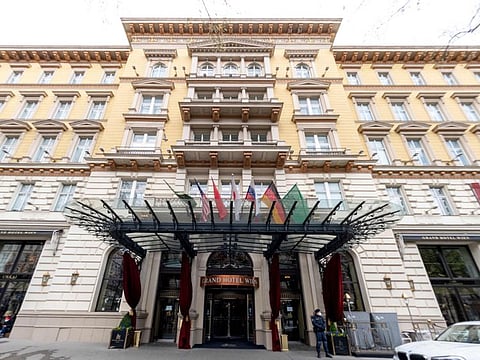Iran and US agree on path back to nuclear deal
Trump pulled out of accord in May 2018 and reimposed harsh economic sanctions

Brussels: The United States and Iran agreed through intermediaries on Tuesday to establish two working groups to try to get both countries back into compliance with the 2015 Iran nuclear deal.
In a meeting of the current members of the deal in Vienna, all parties agreed to establish one working group to focus on how to get the United States back to the deal by lifting harsh economic sanctions imposed or reimposed after President Donald Trump pulled out of the accord in May 2018.
The other working group will focus on how to get Iran back into compliance with the accord’s limitations on nuclear enrichment and stockpiles of enriched uranium.
The two groups have already begun their efforts, according to Mikhail Ulyanov, the Russian representative who is ambassador to international organisations in Vienna.
Ulyanov called Tuesday’s meeting of the joint commission on the Iran deal an initial success.
But in a Twitter message, he cautioned that restoration of the deal “will not happen immediately. It will take some time. How long? Nobody knows. The most important thing after today’s meeting of the Joint Commission is that practical work towards achieving this goal has started.”
President Joe Biden has vowed to bring the United States back into the deal, which would mean removing the 1,600 or so sanctions imposed on Iran after Trump pulled out of an accord he regarded as too weak and tried to bring Iran to renegotiate through economic pressure. In part because of those sanctions, the European signatories failed to provide the economic benefits Iran was due. After about a year, in 2019, Iran began to violate the enrichment limits of the accord.
United States officials now estimate that Iran’s “breakout time” - the time necessary to assemble enough highly enriched uranium for a nuclear weapon - is now down to a few months.
Iranian officials say they can return to compliance fairly quickly, but insist they want the United States to lift sanctions first. Washington wants Iran to return to compliance first.
In Vienna, Iran met with the other current members of the deal - Britain, China, France, Germany and Russia, under the chairmanship of the European Union - in a grand hotel ballroom, while the American team, led by special envoy Robert Malley, worked separately in a nearby hotel. Iran has refused to meet directly with the United States, so the Europeans have been undertaking a kind of shuttle diplomacy.
The United States also wants to convince Iran to negotiate longer time limits for the accord and to begin further talks on limiting Iran’s missiles and support for allies and Shiite militias through the region, including in Syria, Iraq and Lebanon. Iran has said that it has no interest in considering further negotiations until the United States restores the status quo ante and rejoins the deal.
More broadly, American officials are trying to gauge whether the United States and Iran can agree on how each can come back into compliance with the nuclear deal - or, at least, work toward bridging any gaps in a mutual understanding.
Iran was represented by Abbas Araghchi, the deputy foreign minister, who was crucial to negotiating the 2015 deal, known formally as the Joint Comprehensive Plan of Action, or JCPOA, with the administration of President Barack Obama and Biden, then vice president.
Araghchi said in a statement after the talks that lifting US sanctions would be “the first and most necessary step in reviving the JCPOA. The Islamic Republic of Iran is fully ready to stop its retaliation nuclear activity and return to its full commitments as soon as US sanctions are lifted and verified.”
Speaking with Iran’s state television, Araghchi said, “I can say overall that it was a constructive meeting.”
Speaking on Monday, a State Department spokesman, Ned Price, said talks will be structured around working groups that the Europeans will form with the other parties to the accord. He called the talks a “healthy step forward” but added that “we don’t anticipate an early or immediate breakthrough, as these discussions, we fully expect, will be difficult.”









